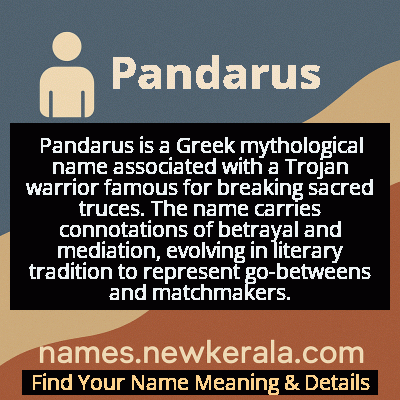Pandarus Name Meaning & Details
Origin, Popularity, Numerology Analysis & Name Meaning of Pandarus
Discover the origin, meaning, and cultural significance of the name PANDARUS. Delve into its historical roots and explore the lasting impact it has had on communities and traditions.
Name
Pandarus
Gender
Male
Origin
Greek
Lucky Number
4
Meaning of the Name - Pandarus
Pandarus is a Greek mythological name associated with a Trojan warrior famous for breaking sacred truces. The name carries connotations of betrayal and mediation, evolving in literary tradition to represent go-betweens and matchmakers.
Pandarus - Complete Numerology Analysis
Your Numerology Number
Based on Pythagorean Numerology System
Ruling Planet
Uranus (Rahu)
Positive Nature
Strong sense of order, loyal, practical, and disciplined.
Negative Traits
Stubborn, overly serious, rigid, and prone to feeling restricted.
Lucky Colours
Blue, gray.
Lucky Days
Saturday.
Lucky Stones
Blue sapphire.
Harmony Numbers
1, 7, 8.
Best Suited Professions
Managers, engineers, accountants, organizers.
What People Like About You
Dependability, discipline, practicality.
Famous People Named Pandarus
Pandarus of Lycia
Mythological Archer
Trojan warrior who broke the truce between Greeks and Trojans by wounding Menelaus
Pandarus (Literary Character)
Literary Figure
Character in Chaucer's 'Troilus and Criseyde' who acts as go-between for the lovers
Pandarus (Shakespearean Character)
Theatrical Character
Appears in Shakespeare's 'Troilus and Cressida' as Cressida's uncle and matchmaker
Name Variations & International Equivalents
Click on blue names to explore their detailed meanings. Gray names with will be available soon.
Cultural & Historical Significance
In later literary traditions, particularly in medieval and Renaissance literature, Pandarus undergoes a significant transformation. In Chaucer's 'Troilus and Criseyde' and Shakespeare's 'Troilus and Cressida', he evolves from a warrior into a go-between and matchmaker, facilitating the love affair between Troilus and Cressida. This reinterpretation created the English word 'pander', meaning to act as a procurer or to cater to others' base desires. This dual legacy makes Pandarus one of the most culturally complex figures from classical mythology, representing both military betrayal and romantic mediation across different literary epochs.
Extended Personality Analysis
Individuals named Pandarus are often perceived as complex characters with a mixture of cunning and opportunism. They tend to be persuasive communicators who understand human nature well, capable of manipulating situations to their advantage. This namesake carries an inherent duality - on one hand, they may possess strategic thinking and the ability to navigate complex social situations; on the other, they might struggle with ethical boundaries and loyalty. Their actions are often driven by immediate gains rather than long-term principles, making them both effective in certain contexts and potentially unreliable in others.
The mythological legacy suggests that Pandarus-types are natural intermediaries who thrive in situations requiring negotiation and connection-making. However, they may also exhibit a tendency toward impulsiveness and poor judgment when under pressure or tempted by short-term rewards. Their personality is marked by a certain moral ambiguity - they can be charming and effective in achieving specific goals, but their methods may compromise trust and integrity. This creates a fascinating psychological profile of someone who is simultaneously useful and dangerous within social and professional networks.
Modern Usage & Popularity
In contemporary times, the name Pandarus is exceptionally rare as a given name, primarily due to its strong mythological associations with betrayal and questionable ethics. It appears almost exclusively in academic contexts, classical studies, and literary discussions rather than in birth registries. The name's usage is largely confined to fictional characters in works that deliberately reference classical mythology or seek to evoke its complex legacy. Modern parents generally avoid this name because of its negative connotations, though it occasionally surfaces in creative writing or as a distinctive choice for pets in households with classical education backgrounds. The name has never appeared in popular baby name rankings and shows no signs of trending upward.
Symbolic & Spiritual Meanings
Pandarus symbolizes the dangerous consequences of broken trust and the fragility of agreements in human relationships. His mythological act of shattering the truce represents how individual actions can unravel carefully constructed peace and escalate conflict beyond control. The name has come to embody the archetype of the intermediary who operates in moral gray areas - someone who facilitates connections but may compromise integrity in the process. Symbolically, Pandarus represents the tension between personal ambition and collective responsibility, serving as a cautionary figure about the ripple effects of unethical choices.
In its literary evolution, Pandarus also symbolizes the transformation of cultural values across epochs - from a warrior whose single act changes the course of war to a romantic go-between in medieval literature. This shift reflects changing societal concerns from martial honor to courtly love and personal relationships. The name carries the symbolic weight of mediation itself, representing both the potential for connection and the danger of manipulation that comes with playing intermediary roles in human affairs.

